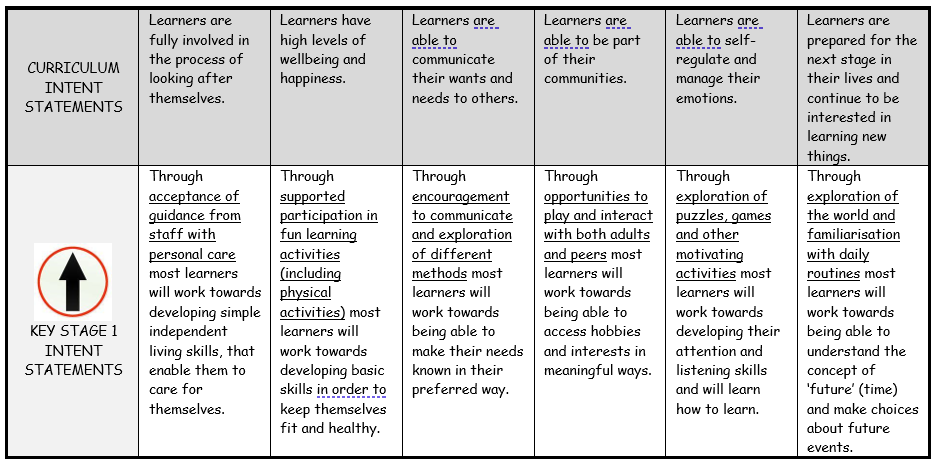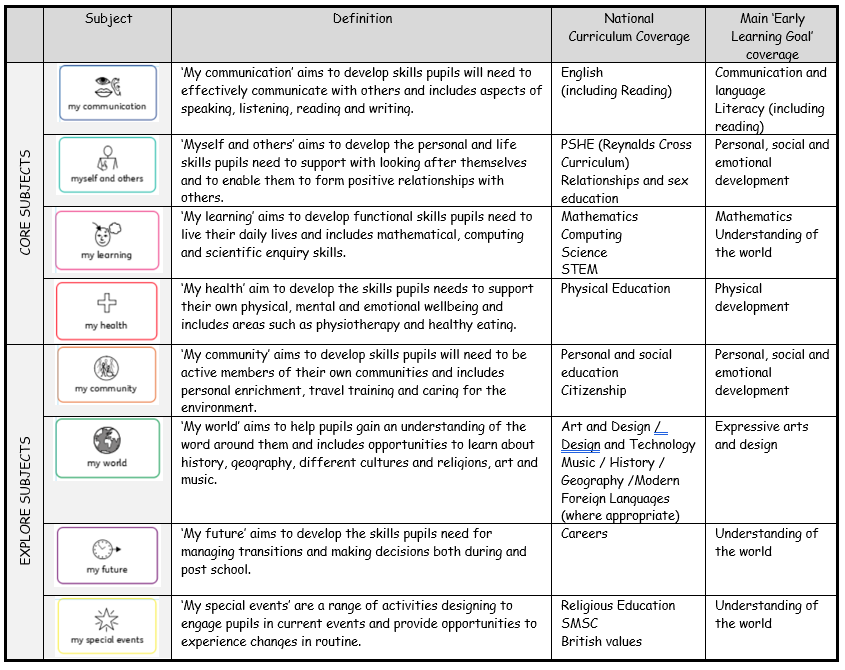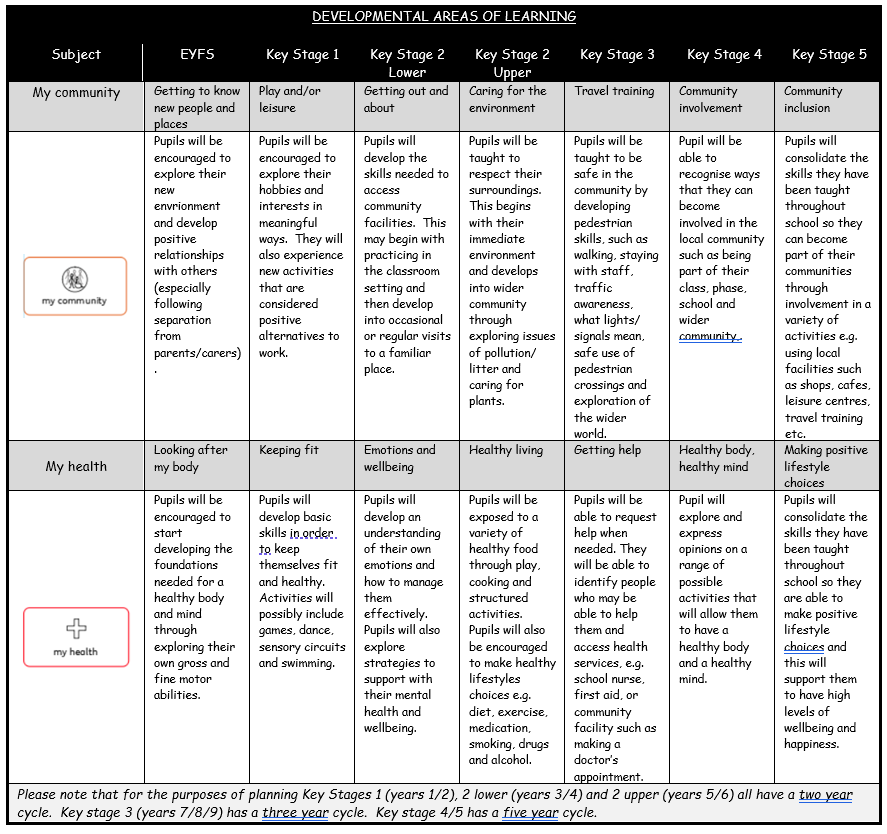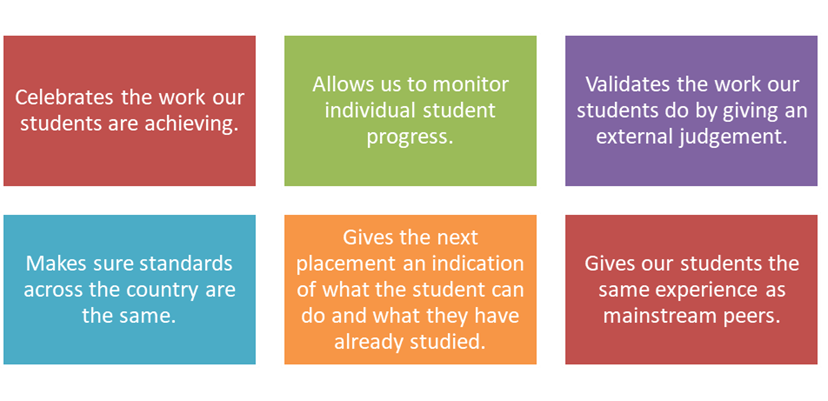Curriculum
The views of our stakeholders (staff, parents, pupils and Governors) have been used to create six statements that highlight what we want our pupils to learn about before they leave school. These are:-
- Learners are fully involved in the process of looking after themselves.
- Learners have high levels of wellbeing and happiness.
- Learners are able to communicate their wants and needs to others.
- Learners are able to be part of their communities.
- Learners are able to self-regulate and manage their emotions.
- Learners are prepared for the next stage in their lives and continue to be interested in learning new things.
In addition to this, information from staff teaching different aged pupils has been used to break down these statements to clearly show what we intend the majority of pupils to learn by the end of each Key Stage, from when they arrive in early years until they leave at the end of Year 14. These statements form the basis of the curriculum. An example of this is shown below showing the expectations for the end of Key Stage 1:-

Curriculum implementation
|
How is our curriculum organised in order to achieve our curriculum intent? |
Reynalds Cross subjects – making subjects meaningful
Information from the curriculum intent has been used to determine subject headings that address priority areas of learning for Reynalds Cross pupils in a meaningful way. Subjects are split into ‘Core subjects’ and ‘Explore subjects’. ‘Core subjects’ cover the basic everyday skills learners need (such as communication, living skills and reading) and need to taught in a personalised way. ‘Explore subjects’ are those that allow pupils to explore the wider world – providing a broad and balanced curriculum through lots of different experiences and opportunities.
The subject headings are shown below along with their definitions, the National Curriculum coverage for each subject (additional information about meeting the National Curriculum requirements can be seen section 4) and links to the EYFS framework.

Curriculum sequencing – ensuring progression through the different subjects
In order to ensure progression in each of the subject areas, the curriculum intent statements have been used to provide more detail about what pupils need to learn in each Key Stage. This ensures that previous knowledge is built upon and learning is sequenced. Two examples for the subjects ‘my community’ and ‘my health’ are given below.

These may seem challenging as learners get older as they cover concepts that are more complex, however, these will be carefully differentiated by teachers when planning. For example ‘travel training’ – could mean catching a bus independently but could also mean teaching early pedestrian skills such as cooperating with a member of staff when moving around school or role playing crossing the road in the classroom.
As some classes may contain pupils from different Key Stages teachers will accommodate for this – providing the appropriate opportunities and working with other teachers, for example, grouping pupils in Key Stage for some sessions and sharing planning to reduce workload.
If a learner arrives in school without having previously followed the Reynalds Cross curriculum (e.g. transferred from another school, moved to the UK from another country) teachers should continue to plan using progression descriptors for the relevant Key Stage. However, learners should be given time to adjust and be baselined using the school’s assessment tools so that appropriate targets can be set.
Curriculum design – a thematic approach to allow everyone to work together
The curriculum has a thematic approach to give some context to learning and to allow the whole school to work on the same topic at the same time. This gives opportunities for both pupils and staff to work together. Topics therefore cover relatively basic concepts so they are accessible for younger pupils and are functional for the older pupils.
The topics are grouped into three categories which are linked to a range of National Curriculum subjects. These are covered during different terms as follows:-
- Autumn term = creativity (art & design and design & technology)
- Spring term = humanities (history and geography)
- Summer term = Music

The curriculum has been designed so that the majority of the time topics can be used to support learning. However, there may be some areas of the curriculum where the topic is not relevant. In these cases discrete lessons, not linked to the topic, will be taught (for example when teaching Sex and Relationships education).
Curriculum coverage – long term planning providing a broad and balanced curriculum
Each subject has a long term plan outlining what is to be taught in each Key Stage and, where relevant, National Curriculum links.
Additional information about Early Years Foundation Stage (EYFS) – meeting the needs of our youngest pupils
The EYFS is based at the 'Green Lane Site'. It caters for children of Nursery and Reception age (3-5), giving them access to an Early Years style of curriculum, with adaptations to suit different learning needs and styles. Children attend for 3 hours a day for their nursery year, and full time for their Reception year.
The EYFS department acts as an assessment setting. While many of the children continue to Reynalds Cross for their Year 1 year, some are assessed as having learning needs that may be better met in other provisions.
The EYFS focuses on the 'Prime Areas' of; Communication, Physical Development, and Personal Social and Emotional Development. These areas underpin much of children's early learning and development, and so are evidenced through all learning opportunities in some form. Then the 'Specific Areas' of Mathematics, Literacy, Understanding the World, and Expressive Arts and Design form additional aspects of the children's learning.
The learning opportunities within the EYFS comprise a mixture of free play opportunities through 'Continuous Provision', and adult directed learning opportunities either 1:1 or in small groups. Every part of the day is considered a learning experience, with learning opportunities embedded throughout routines such as mealtimes and self-care tasks, as well as within discrete 'lesson' activities.
Children's progress towards 'Early Learning Goals' is assessed using small step target trackers, ensuring that every achievement is valued.
Additional information about 14-19 Stage (Key Stages 4 and 5) – meeting the needs of our oldest pupils
The 14-19 Stage was created so students in Key Stages 4 and 5 have the opportunity to spend a full five years working on preparation for life after school and their next destinations. The students study the same subjects as the rest of school, however, learning is more personalised as each follows their own accredited programme of study (including meeting the National Curriculum statutory requirements for pupils in Key Stage 4). There is a wide range of activities on offer including opportunities for students to choose their own enrichment options, complete life skills work, use community facilities and experience of range of tasks to support future destinations such as work experience and tasters, college link course and positive alternative to work sessions.
Achievement in the 14-19 Stage is accredited through a range of Entry 1, 2 and 3 qualifications. The awarding body we use is ASDAN and we currently offer Personal Progress, Employability and Personal & Social Development. Work is undertaken in units and students leave with a range of awards, certificates and diplomas.
The diagram below outlines the reasons we work on qualifications with our pupils.

CURRICULUM IMPACT – How do we measure how successful our curriculum is?
How do we measure how well we have achieved our curriculum intent?
|
What does the Reynalds Cross School Curriculum offer? |
What is the aim? |
How is this measured? |
What are the success criteria? |
Status of the success criteria at the end of 2023/24 |
|
|
|
PUPIL PROGRESSION |
We ensure that pupils are making progress when following the curriculum. |
Data from personal targets (linked to Education Health and Care Plans) |
The majority (80%) of pupils make at least expected progress. |
Achieved |
|
Attendance monitoring |
Attendance for the term is at least 90%. |
Achieved (89.5%) |
|||
|
EYFS progression |
The majority (80%) of EYFS pupils make at least expected progress using the EYFS assessment tool |
Achieved |
|||
|
|
PUPIL SUPPORT |
We ensure that a range of strategies and interventions are put in place if pupils are having difficulties following the curriculum. |
Data meetings |
Interventions are put in place for pupils who are not making progress (or if any other concerns). |
Achieved |
|
Tracking of vulnerable groups. |
Vulnerable groups are making at least equal progress to their peers with their personal targets. |
Achieved |
|||
|
Engagement model tracking |
Pupils with more complex needs have progress measured using the engagement model. |
Achieved |
|||
|
|
EVOLVING PROVISION |
We ensure the curriculum is regularly updated and improved. |
Feedback from staff |
Staff are given opportunities to give feedback about the curriculum and these are acted upon. |
Achieved |
|
Feedback from parents |
Parents are given opportunities to give feedback about the curriculum and these are acted upon. |
Achieved |
|||
|
Feedback from pupils |
Pupils are given opportunities to give feedback about the curriculum and these are acted upon. |
Achieved |
|||
|
Feedback from other agencies |
Other agencies are given opportunities to give feedback about the curriculum and these are acted upon. |
Achieved |
|||
|
|
HIGH STANDARD DELIVERY |
We ensure that curriculum delivery is of a high standard. |
Planning scrutiny |
Planning is scrutinised and any improvements required shared and monitored. |
Achieved |
|
Work scrutiny |
Pupil work is scrutinised and any improvements required shared and monitored. |
Achieved |
|||
|
Timetable audit |
Timetables follow the school guidance including minimum number of lessons. |
Mostly achieved* |
|||
|
Internal moderation of work |
Internal moderation sessions take place half termly. |
Achieved |
|||
|
External moderation of work |
External moderation sessions take place. |
Achieved |
|||
|
Lesson observations |
Lesson observations are completed and any improvements shared and monitored. |
Achieved |
|||
|
CPD opportunities |
CPD opportunities are available to all staff. |
Achieved |
|||
|
Performance reviews |
Performance reviews completed with no staff requiring capability. |
Acheived |
|||
|
|
EFFECTIVE TEACHING |
We ensure all curriculum subjects are taught effectively. |
Subject leadership groups action plan scrutiny |
Subject leadership group action plans are scrutinised and any improvements required shared and monitored. |
Achieved |
|
Termly subject focus |
There is a half termly focus for subject leadership groups including learning walks, moderation activities and parent sessions. |
Achieved |
|||
|
|
CELEBRATION OF SUCCESSES |
We ensure curriculum successes are celebrated and shared with next destinations. |
Retention data |
The majority of pupils (80%) move from KS3 to KS4. |
Achieved |
|
The majority of pupils (80%) move from KS4 to KS5. |
Achieved |
||||
|
Qualifications data |
The majority of leavers (80%) achieved the qualifications predicted when they started KS4. |
No leavers |
|||
|
The majority of ASDAN modules (80%) pass external moderation. |
Achieved |
||||
|
Transition planning (pupil voice) data |
The majority of leavers (80%) attend a post school placement of their choice. |
No leavers |
|||
|
Certificates and trophies |
Trophies are given out for effort and achievement on a termly basis (as well as certificates weekly). |
Achieved |
|||
|
|
PLANNING FOR THE FUTURE |
We ensure our future planning (CEIAG) provision delivered through the curriculum is effective. |
Destinations data |
The majority of leavers (80%) from the last academic year had sustained participation at their next destination (excluding those who did not respond). |
Achieved |
|
Gatsby benchmarks |
At least 80% achieved in each of the Gatsby Benchmarks. |
Achieved |
|||
* Some variation in the hours taught seen across classes, this will be reviewed in 2024/25.
What additional tools do we use to help with setting and evaluating pupil progression?
|
|
|
|
|
|
|
|
|
|
Solar is our online assessment tool tracker which allows us to record and report on the targets we set. |
EHCPs are support plans for our pupils. They outline a pupil’s individual needs. |
Developmental walls outline the small steps that pupils need to make in order to make progress in a range of National Curriculum subjects. These contain elements of the Pre-Key Stage Standards. |
The EYFS framework focuses on pupil’s wellbeing and development as they begin growth and prepare for their entrance into compulsory education. |
ASDAN is a qualification provider which allow us to accredit work completed by the older pupils. |
The Engagement Model is a strategy used to measure the linear and lateral progress of pupils with more complex needs. |
The National Curriculum is a set of subjects and standards used by schools so children learn the same things. It covers what subjects are taught and the standards children should reach in each subject. |
The Gatsby Benchmarks are a framework for school leaders and careers advisors to assess the development of our pupils in employability skills. |
|
For further information about our curriculum please contact Jacqui Lucas (Assistant Headteacher) via the school office. |

